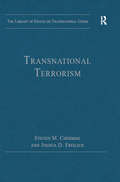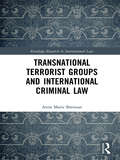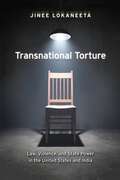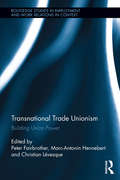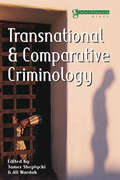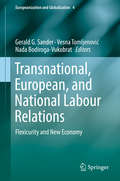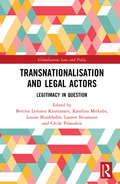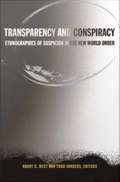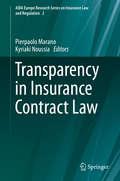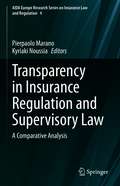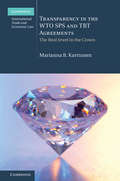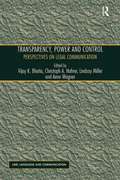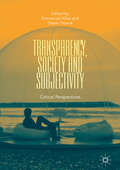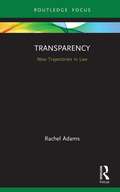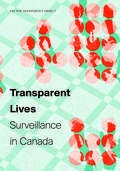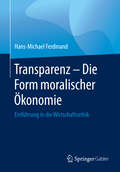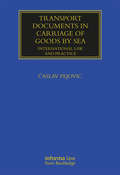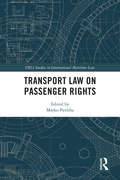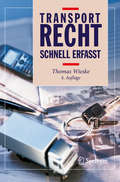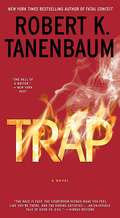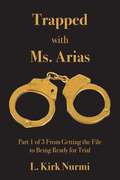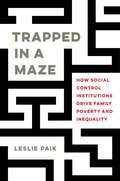- Table View
- List View
Transnational Terrorism (The Library of Essays on Transnational Crime)
by Steven M. ChermakThe dramatic terrorist attacks of 9/11 highlighted significant gaps in research on the topic as governments, community groups, social service agencies and law enforcement agencies were forced to respond without any evidence-based guidance on best practices for tactics, strategies, and policy development. The essays selected for this volume demonstrate that transnational terrorism is now a thriving area of study and display the breadth and depth of scholarship that has recently been published. The research draws attention to global patterns of transnational terrorism; highlights various structural and cultural explanations; provides an overview of some of the ways that terrorism impacts society; and discusses strategies used to effectively respond to transnational terrorism. This volume, which is of interest to academics, policymakers and practitioners, provides a repository of some of the best contemporary research in this field.
Transnational Terrorist Groups and International Criminal Law (Routledge Research in International Law)
by Anna Marie BrennanAttacks by network-based transnational terrorist groups cause on average 25,000 deaths every year worldwide, with the law enforcement agencies of some states facing many challenges in bringing those responsible to justice. Despite various attempts to codify the law on transnational terrorism since the 1930s, a crime of transnational terrorism under international law remains contested, reflecting concerns regarding the relative importance of prosecuting members of transnational terrorist groups before the International Criminal Court. This book critically examines the limits of international criminal law in bringing members of transnational terrorist groups to justice in the context of changing methods of warfare, drawing from human rights, sociology, and best practices in international criminal justice. Drawing on organisational network theory, Anna Marie Brennan explores the nature of international crimes and assesses the potential for the International Criminal Court to prosecute and investigate alleged crimes perpetrated by members of transnational terrorist groups, paying particular attention to their modus operandi and organisational structure. This book argues that because of the network-based organisational structure of some transnational terrorist groups, achieving justice for victims will prove challenging, in the context of the relationship between the commanders and the subordinate members of the group requiring a re-evaluation of accountability mechanisms at the international level. In advancing an innovative perspective on the accountability of members of transnational terrorist groups, and in offering solutions to current challenges, the book will be of great interest and use to academic, practitioners, and students engaged in the study of terrorism, the ICC, or international humanitarian law.
Transnational Torture: Law, Violence, and State Power in the United States and India
by Jinee Lokaneeta"Transnational Torture by Jinee Lokaneeta reviewed with Prachi Patankar" on the blog Kafila.Evidence of torture at Abu Ghraib prison in Iraq and harsh interrogation techniques at Guantánamo Bay beg the question: has the “war on terror” forced liberal democracies to rethink their policies and laws against torture? Transnational Torture focuses on the legal and political discourses on torture in India and the United States—two common-law based constitutional democracies—to theorize the relationship between law, violence, and state power in liberal democracies.Analyzing about one hundred landmark Supreme Court cases on torture in India and the United States, memos and popular imagery of torture, Jinee Lokaneeta compellingly demonstrates that even before recent debates on the use of torture in the war on terror, the laws of interrogation were much more ambivalent about the infliction of excess pain and suffering than most political and legal theorists have acknowledged. Rather than viewing the recent policies on interrogation as anomalous or exceptional, Lokaneeta effectively argues that efforts to accommodate excess violence—a constantly negotiated process—are long standing features of routine interrogations in both the United States and India, concluding that the infliction of excess violence is more central to democratic governance than is acknowledged in western jurisprudence.
Transnational Trade Unionism: Building Union Power (Routledge Studies in Employment and Work Relations in Context #10)
by Peter Fairbrother Marc-Antonin Hennebert Christian LévesqueTransnational trade union action has expanded significantly over the last few decades and has taken a variety of shapes and trajectories. This book is concerned with understanding the spatial extension of trade union action, and in particular the development of new forms of collective mobilization, network-building, and forms of regulation that bridge local and transnational issues. Through the work of leading international specialists, this collection of essays examines the process and dynamic of transnational trade union action and provides analytical and conceptual tools to understand these developments. The research presented here emphasizes that the direction of transnational solidarity remains contested, subject to experimentation and negotiation, and includes studies of often overlooked developments in transition and developing countries with original analyses from the European Union and NAFTA areas. Providing a fresh examination of transnational solidarity, this volume offers neither a romantic or overly optimistic narrative of a borderless unionism, nor does it fall into a fatalistic or pessimistic account of international union solidarity. Through original research conducted at different levels, this book disentangles the processes and dynamics of institution building and challenges the conventional national based forms of unionism that prevailed in the latter half of the twentieth century.
Transnational and Comparative Criminology
by Ali Wardak James SheptyckThis book examines the issues of crime and its control in the twenty-first century - an era of human history where people live in an increasingly interconnected and interdependent world - providing invaluable and first-hand readings for undergraduate and postgradate students.
Transnational, European, and National Labour Relations: Flexicurity and New Economy (Europeanization and Globalization #4)
by Nada Bodiroga-Vukobrat Gerald G. Sander Vesna TomljenovićThis book employs an innovative approach to explore the topic of flexicurity and related changes in the working world, the importance of which for the overall economic and social development is gradually being recognised. It focuses on the changing nature of work and its impact on EU law and national labour and social security laws. Though the transformation of regulatory and institutional frameworks of labour relations follows different patterns in different EU Member States, it is nevertheless a common phenomenon that offers an excellent opportunity for mutual learning experiences and comparing notes on best practices. Taking these ideas as a starting point, the book presents a collection of research on various aspects and implications of changing labour relations in the EU Member States. The opening chapters address the internal market dimension of the transformation of employment relations by investigating how social dumping, integration of migrant workers, and cross-border mergers influence national labour policies and laws. The book further analyses linguistic and terminological challenges in the field of labour law in the EU’s multi-lingual legal environment. Subsequent chapters cover various theoretical and practical issues, such as the impact of chain-liability regulatory models on the legal situation of workers in subcontracting networks, and modern work arrangements in the collaborative or ‘gig’ economy. Other chapters are dedicated to issues of jurisdiction and law applicable to individual employment contracts, as well as alternative resolution mechanisms in labour disputes. The next section offers fresh insights on and a critical overview of the well-known Danish and Dutch models of flexicurity, often cited as role models for reforms of labour markets in other EU Member States. Three individual chapters investigate specific aspects of flexicurity in Croatia, in terms of individual dismissals, life-long learning and the impact of non-standard employment on future pension entitlements. One paper explores temporary agency work in Germany as an important instrument of flexicurity, while another discusses various forms of work used in Slovenia in the context of flexibilization of work relations. Many challenges still lie ahead, and the primary aim of this book is to provide a solid basis for informed future discussions.
Transnationalisation and Legal Actors: Legitimacy in Question (Globalization: Law and Policy)
by Cécile Pelaudeix Bettina Lemann Kristiansen Katerina Mitkidis Lauren Neumann Louise MunkholmTransnational tendencies have led to a pluralistic legal environment in which emerging and established legal actors, regulatory levels and types of legal norms co-exist, compete and interact in complex ways. This challenges and changes not only how legal norms are created, applied and enforced but also when these actors, norms and processes are considered legitimate. The book investigates how states and non-state actors interact in transnational settings and pays attention to the understudied question of what effect transnational tendencies have on the legitimacy of legal actors, norms and processes. It seeks to confront three fundamental questions: Has legitimacy significantly changed? Who creates norms and with which consequences for legal procedures and norms? The book considers the question of legitimacy from a broad range of legal perspectives, including environmental law, human rights law and commercial law. It maps out the contours of legitimacy today with an emphasis on the reactions of central actors like states and courts to transnational tendencies. The book thereby provides a conceptually powerful structure within which to further debate the complexity of transnational tendencies in law and proposes innovative approaches to problem solving while designing pathways for further reflection on the development of law in a transnational context.
Transparency and Conspiracy: Ethnographies of Suspicion in the New World Order
by Harry G. West Todd SandersTransparency has, in recent years, become a watchword for good governance. Policymakers and analysts alike evaluate political and economic institutions--courts, corporations, nation-states--according to the transparency of their operating procedures. With the dawn of the New World Order and the "mutual veil dropping" of the post-Cold War era, many have asserted that power in our contemporary world is more transparent than ever. Yet from the perspective of the relatively less privileged, the operation of power often appears opaque and unpredictable. Through vivid ethnographic analyses, Transparency and Conspiracy examines a vast range of expressions of the popular suspicion of power--including forms of shamanism, sorcery, conspiracy theory, and urban legends--illuminating them as ways of making sense of the world in the midst of tumultuous and uneven processes of modernization. In this collection leading anthropologists reveal the variations and commonalities in conspiratorial thinking or occult cosmologies around the globe--in Korea, Tanzania, Mozambique, New York City, Indonesia, Mongolia, Nigeria, and Orange County, California. The contributors chronicle how people express profound suspicions of the United Nations, the state, political parties, police, courts, international financial institutions, banks, traders and shopkeepers, media, churches, intellectuals, and the wealthy. Rather than focusing on the veracity of these convictions, Transparency and Conspiracy investigates who believes what and why. It makes a compelling argument against the dismissal of conspiracy theories and occult cosmologies as antimodern, irrational oversimplifications, showing how these beliefs render the world more complex by calling attention to its contradictions and proposing alternative ways of understanding it. Contributors. Misty Bastian, Karen McCarthy Brown, Jean Comaroff, John Comaroff, Susan Harding, Daniel Hellinger, Caroline Humphrey, Laurel Kendall, Todd Sanders, Albert Schrauwers, Kathleen Stewart, Harry G. West
Transparency in Health and Health Care in the United States: Law and Ethics
by Holly Fernandez Lynch I. Glenn Cohen Carmel Shachar Barbara J. EvansTransparency is a concept that is becoming increasingly lauded as a solution to a host of problems in the American health care system. Transparency initiatives show great promise, including empowering patients and other stakeholders to make more efficient decisions, improve resource allocation, and better regulate the health care industry. Nevertheless, transparency is not a cure-all for the problems facing the modern health care system. The authors of this volume present a nuanced view of transparency, exploring ways in which transparency has succeeded and ways in which transparency initiatives have room for improvement. Working at the intersection of law, medicine, ethics, and business, the book goes beyond the buzzwords to the heart of transparency's transformative potential, while interrogating its obstacles and downsides. It should be read by anyone looking for a better understanding of transparency in the health care context.
Transparency in Insurance Contract Law (AIDA Europe Research Series on Insurance Law and Regulation #2)
by Kyriaki Noussia Pierpaolo MaranoThis Volume of the AIDA Europe Research Series on Insurance Law and Regulation focuses on transparency as the guiding principle of modern insurance law. It consists of chapters written by leaders in the respective field, who address transparency in a range of civil and common law jurisdictions, along with overview chapters. Each chapter reviews the transparency principles applicable in the jurisdiction discussed. Whether expressly or impliedly, all jurisdictions recognize a duty on the part of the insured to make a fair presentation of the risk when submitting a proposal for cover to the insurers, although there is little consensus on the scope of that duty. Disputed matters in this regard include: whether it is satisfied by honest answers to express questions, or whether there is a spontaneous duty of disclosure; whether facts relating to the insured’s character, as opposed to the nature of the risk itself, are to be presented to the insurers; the role of insurance intermediaries in the placement process; and the remedy for breach of duty. Transparency is, however, a much wider concept. Potential policyholders are in principle entitled to be made aware of the key terms of coverage and to be warned of hidden traps (such as conditions precedent, average clauses and excess provisions), but there are a range of different approaches. Some jurisdictions have adopted a “soft law” approach, using codes of practice for pre-contract disclosure, while other jurisdictions employ the rather nebulous duty of (utmost) good faith. Leaving aside placement, transparency is also demanded after the policy has been incepted. The insured is required to be transparent during the claims process. There is less consistency in national legislation regarding the implementation of transparency by insurers in the context of handling claims.
Transparency in Insurance Regulation and Supervisory Law: A Comparative Analysis (AIDA Europe Research Series on Insurance Law and Regulation #4)
by Kyriaki Noussia Pierpaolo MaranoThis volume focuses on transparency as the guiding principle for insurance regulation and supervisory law. All chapters were written by experts in their respective fields, who address transparency in a wide range of European and non-European jurisdictions. Each chapter reviews the transparency principles applicable in the jurisdiction discussed. While the European jurisdictions reflect different facets of the principle as emerging from EU law on insurance, the principle has developed quite differently in other jurisdictions.
Transparency in International Investment Arbitration
by Euler, Dimitrij and Gehring, Markus and Scherer, Maxi and Wong, Meagan and Hadgett, Rebecca Dimitrij Euler Markus Gehring Maxi Scherer Meagan Wong Rebecca HadgettThe topic of transparency in international investment arbitration is gaining increasing attention. This in-depth commentary analyses the UNCITRAL Rules on Transparency in Treaty-Based Investor-State Arbitration, one of the most recent and innovative developments in international law. Focusing on the application of these rules, contributors analyse the issue of transparency in investment law more broadly and provide in-depth guidance on how to apply the UNCITRAL transparency rules. Chapters encompass all treaty-based disputes between investors and state, examining the perspectives of disputing parties, third parties, non-disputing state parties and arbitral tribunals. The contributors each have a strong background in investment arbitration, in both professional practice and academia. This commentary will be of interest to all actors involved in investment arbitrations, especially practitioners, counsels, NGOs and scholars in the fields of international law, commercial arbitration and investor-state arbitration.
Transparency in International Law
by Anne Peters Andrea BianchiWhile its importance in domestic law has long been acknowledged, transparency has until now remained largely unexplored in international law. This study of transparency issues in key areas such as international economic law, environmental law, human rights law and humanitarian law brings together new and important insights on this pressing issue. Contributors explore the framing and content of transparency in their respective fields with regard to proceedings, institutions, law-making processes and legal culture, and a selection of cross-cutting essays completes the study by examining transparency in international law-making and adjudication.
Transparency in the WTO SPS and TBT Agreements: The Real Jewel in the Crown (Cambridge International Trade and Economic Law)
by Marianna B. KarttunenTransparency of trade regulations by all WTO Members is essential for open, fair and predictable trade relations. A myriad of different regulations apply in all WTO Members and have the potential for affecting international trade. The Agreements on the Application of Sanitary and Phytosanitary measures and on Technical Barriers to Trade provide the most comprehensive frameworks in the WTO to address the costs arising from such regulatory diversity, through obligations on regulatory transparency and co-operation. This book gives a detailed account of the legal disciplines of the two Agreements, an in-depth presentation of discussions between WTO Members, and an overview of the few cases that end up in formal dispute settlement. It shows that the strength of the WTO legal and institutional system goes well beyond its dispute settlement system, with transparency enabling implementation of WTO obligations through better information sharing and co-operation among Members themselves, through non-judicial means.
Transparency, Power, and Control: Perspectives on Legal Communication (Law, Language and Communication)
by Anne Wagner Christoph A. HafnerThis book brings together academics and practitioners from a range of disciplines from more than twenty countries to reflect on the growing importance of transparency, power and control in our international community and how these concerns and ideas have been examined, used and interpreted in a range of national and international contexts. Contributors explore these issues from a range of overlapping concerns and perspectives, such as semiotic, sociolinguistic, psychological, philosophical, and visual in diverse socio-political, administrative, institutional, as well as legal contexts. The collection examines the ways in which 'actors' in our society - legislators, politicians, activists, and artists - have provoked public discourses to confront these issues.
Transparency, Society and Subjectivity: Critical Perspectives
by Emmanuel Alloa Dieter ThomäThis book critically engages with the idea of transparency whose ubiquitous demand stands in stark contrast to its lack of conceptual clarity. The book carefully examines this notion in its own right, traces its emergence in Early Modernity and analyzes its omnipresence in contemporary rhetoric. Today, transparency has become a catchword outplaying other Enlightenment values like empowerment, sincerity and the notion of a public sphere. In a suspicious manner, transparency is entangled in the discourses on power, surveillance, and self-exposure. Bringing together prominent scholars from the emerging field of Critical Transparency Studies, the book offers a map of the various sites at which transparency has become virulent and connects the dots between past and present. By studying its appearances in today’s hyper-mediated economies of information and by linking it back to its historical roots, the book analyzes transparency and its discontents, and scrutinizes the reasons why it has become the imperative of a supposedly post-ideological age.
Transparency: New Trajectories in Law (New Trajectories in Law)
by Rachel AdamsThis book critiques the contemporary recourse to transparency in law and policy. This is, ostensibly, the information age. At the heart of the societal shift toward digitalisation is the call for transparency and the liberalisation of information and data. Yet, with the recent rise of concerns such as 'fake news', post-truth and misinformation, where the policy responses to all these phenomena has been a petition for even greater transparency, it becomes imperative to critically reflect on what this dominant idea means, whom it serves, and what the effects are of its power. In response, this book provides the first sustained critique of the concept of transparency in law and policy. It offers a concise overview of transparency in law and policy around the world, and critiques how this concept works discursively to delimit other forms of governance, other ways of knowing and other realities. It draws on the work of Michel Foucault on discourse, archaeology and genealogy, together with later Foucaultian scholars, including Gayatri Chakravorty Spivak and Judith Butler, as a theoretical framework for challenging and thinking anew the history and understanding of what has become one of the most popular buzzwords of 21st century law and governance. At the intersection of law and governance, this book will be of considerable interest to those working in these fields; but also to those engaged in other interdisciplinary areas, including society and technology, the digital humanities, technology laws and policy, global law and policy, as well as the surveillance society.
Transparent Lives: Surveillance in Canada
by David Lyon Valerie Steeves Kevin D. Haggerty Colin J. Bennett"Although most Canadians are familiar with surveillance cameras and airport security, relatively few are aware of the extent to which the potential for surveillance is now embedded in virtually every aspect of our lives. We cannot walk down a city street, register for a class, pay with a credit card, hop on an airplane, or make a telephone call without data being captured and processed. Where does such information go? Who makes use of it, and for what purpose? Is the loss of control over our personal information merely the price we pay for using social media and other forms of electronic communication, or should we be wary of systems that make us visible—and thus vulnerable—to others as never before? The work of a multidisciplinary research team, Transparent Lives explains why and how surveillance is expanding—mostly unchecked—into every facet of our lives. Through an investigation of the major ways in which both government and private sector organizations gather, monitor, analyze, and share information about ordinary citizens, the volume identifies nine key trends in the processing of personal data that together raise urgent questions of privacy and social justice. Intended not only to inform but to make a difference, the volume is deliberately aimed at a broad audience, including legislators and policymakers, journalists, civil liberties groups, educators, and, above all, the reading public."
Transparenz - Die Form moralischer Ökonomie: Einführung in die Wirtschaftsethik
by Hans-Michael FerdinandDas vorliegende Buch ist das leidenschaftliche Plädoyer für die moralische Orientierung der ÖkonomieEs geht aus von der aristotelischen Forderung an ökonomisches Handeln, ein gutes Leben zu ermöglichen. Die dadurch erzeugte enge Verbindung von Ethik und Ökonomie ist seit der Aufklärung im Namen einer falsch verstandenen Freiheit nach und nach verloren gegangen bzw. aufgegeben worden – zugunsten eines mathematisch-mechanischen Funktionsverständnisses der Wirtschaft, in dem für moralisches Handeln kaum Platz bleibt. Auch die Politik scheint heute ihren Einfluss auf die Ökonomie zu reduzieren und übt sich in „marktkonformem“ Handeln. Die Kritik an dem dafür ursächlichen neoliberalen Programm führt zur Begründung einer moralischen Ökonomie, die den aristotelischen Gedanken der Lebensdienlichkeit mit der Wucht der neuzeitlichen Freiheitsidee verbindet, wie sie vor allem in der Tradition von Immanuel Kant vertreten wurde. Öffentlicher Vernunftgebrauch und Transparenz von Entscheidungen werden als die wesentlichen Formanforderungen einer solchen moralischen Ökonomie aufgewiesen.Das Buch bietet durch fünf thematische Schwerpunkte eine umfassende Einführung in die Wirtschaftsethik: Ökonomisches Handeln und MoralÖkonomik – Werkzeug zum guten Leben Kritik der ökonomischen Moral Eine moralische Ökonomie Transparenz – Form moralischer Ökonomie
Transport Documents in Carriage Of Goods by Sea: International Law and Practice (Maritime and Transport Law Library)
by Časlav PejovićBringing a fresh, comparative approach to transport documents used in the carriage of goods by sea, this book covers bills of lading, sea waybills, ship’s delivery orders, multimodal transport documents, and electronic transport documents. The book covers historic developments, current conventions, and thoughts for the future on these transport documents; and delves deeply into the legal issues concerning them. It represents a comprehensive compilation of case and statute law from around the world on this subject. In addition to English law, the book covers American, French, German, and Italian laws, as well as the laws of several East Asian jurisdictions (China, Japan, South Korea). Primarily, the book will be of use to maritime law scholars and students, and lawyers who deal with shipping. It may also be of interest to international traders, banks, and ship masters and officers.
Transport Law on Passenger Rights (IMLI Studies in International Maritime Law)
by Marko PavlihaEurope and also the rest of the world has experienced a boom in mobility over the last thirty years. In light of the protection of increasing number of consumers – passengers it is almost logical that during the past few decades, international and European transport law has developed almost to revolutionary extent, especially in the field of private aviation (air) law with the introduction of unlimited liability of carriers for death and injury of passengers and commendable sophisticated rights in case of denied boarding, cancellation of flights and long delays. This book will cast light through a critical prism on the most important characteristics of the international transport law, the EU legislation and jurisprudence regarding passenger rights during the carriage by air, sea, rail and road. One of the ideas which, however, needs further research is that the commendable legal solutions and experience of the EU can serve as an excellent framework for a new holistic international convention on passengers rights in all transport modes.
Transportrecht - Schnell erfasst: Schnell Erfasst (Recht - schnell erfasst)
by Thomas WieskeÜbersichtlich strukturiert und prägnant zusammengefasst, vermittelt der Band die Grundlagen des Transportrechts: vom deutschen Gütertransportrecht über das Speditions-, Umzugs- und Lagerrecht bis zu den internationalen Regelungen des Transportrechts. Die wichtigsten gesetzlichen Normen werden im Wortlaut vorgestellt, verständlich kommentiert und in Schaubildern und Übersichten zusammenfassend dargestellt. Auch die nationalen und internationalen Speditionsbedingungen finden Berücksichtigung.
Trap (A Butch Karp-Marlene Ciampi Thriller #27)
by Robert K. Tanenbaum“The pace is fast, the courtroom scenes make you feel like you’re there” (Kirkus Reviews)—a devastating deadly explosion sets a breakneck tone that never lets up in New York Times bestselling author Robert K. Tanenbaum’s action-packed Butch Karp legal drama.A tremendous fatal blast rocks a book-signing event where supporters have gathered to see the inspirational leading advocate for New York City charter schools, a Holocaust survivor. A neo-Nazi is the prime suspect, but District Attorney Butch Karp believes the hate crime may be a cover-up for a more sinister plot. The treacherous teacher’s union president has long been furious at the unqualified successes of the charter school movement, which threatens to expose his corrupt practices—manipulation and misappropriation of union funds and, now, possibly even murder. But is there another motive behind the attack that could derail the case? How will Karp discover the set-up, and can he do so in time to bring justice? This exciting legal thriller ends in a dramatic courtroom showdown that proves New York Times bestselling author Robert K. Tanenbaum is always at the top of his game.
Trapped With Ms. Arias: Part 1 of 3 From Getting The File To Being Ready for Trial (Trapped With Ms. Arias)
by L. Kirk NurmiMost people became interested in the State of Arizona v. Jodi Arias January 2, 2013, when opening statements were delivered. Over time that interest became a media sensation and a world-wide phenomenon. However, as her attorney I know that what you saw at trial is only part of the story. Have you ever wondered what happened before the trial began, what it was like to deal with Ms. Arias when the cameras were not rolling? In this book I detail for the reader what happened before the case began, what happened before the cameras were on. I detail the things that you do not know, things that will describe my reality, the reality that I was "Trapped with Ms. Arias."
Trapped in a Maze: How Social Control Institutions Drive Family Poverty and Inequality
by Leslie PaikTrapped in a Maze provides a window into families' lived experiences in poverty by looking at their complex interactions with institutions such as welfare, hospitals, courts, housing, and schools. Families are more intertwined with institutions than ever as they struggle to maintain their eligibility for services and face the possibility that involvement with one institution could trigger other types of institutional oversight. Many poor families find themselves trapped in a multi-institutional maze, stuck in between several systems with no clear path to resolution. Tracing the complex and often unpredictable journeys of families in this maze, this book reveals how the formal rationality by which these institutions ostensibly operate undercuts what they can actually achieve. And worse, it demonstrates how involvement with multiple institutions can perpetuate the conditions of poverty that these families are fighting to escape.
